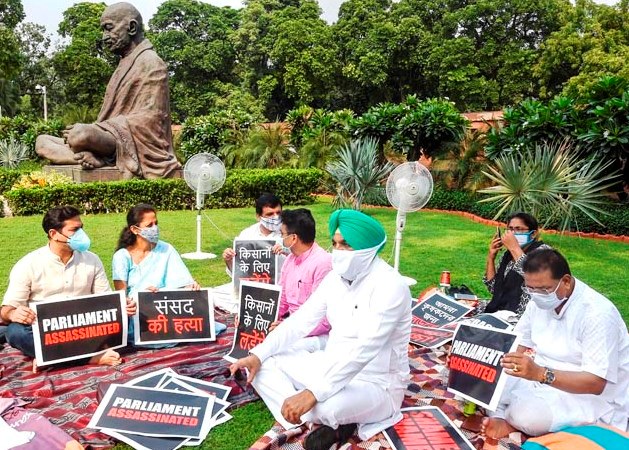When Prime Minister Narendra Modi entered Parliament for the first time after he led his party to a resounding electoral victory in 2014, he bent down and kissed the green-carpeted steps as a mark of respect to the “temple of democracy”.
But, for all purposes, the gesture proved to be a mere photo-op. For over the past six years the Modi government has been in power, it has systematically undermined this very temple of democracy.
Besides the fact that Modi puts in a rare appearance in the two Houses, his government has shown disdain for Parliamentary procedures and processes. The opposition’s demands for discussion on key issues are either not met or conceded with great reluctance. In the last session, the government refused the opposition demand for a discussion on China on the plea that it would jeopardize national security.
In a rush to push through its legislative agenda, the government avoids referring Bills to Parliamentary committees for scrutiny and has further curtailed the role of Parliament by taking the route of promulgating ordinances. Then again committees which usually witness bipartisan discussion are now openly divided along political lines.
In the recently concluded monsoon session, the government’s contempt for Parliament was on display when it did away with question hour which allows members to hold ministers accountable for their policies. Members were consequently deprived of their right to seek answers from the treasury, which often yields valuable information and insight.
ALSO READ: Can BJP Take On Punjab Farmers?
The final blow was dealt when the government rammed through the three contentious farm Bills and Rajya Sabha deputy chairperson Harivansh Narayan Singh came to the aid of the treasury benches by ignoring the opposition demand for a vote on the legislation.
As a result, relations between the government and the opposition have touched a new low. Rajya Sabha chairman Venkaiah Naidu suspended eight members for unruly behaviour and the opposition responded by boycotting the session. The monsoon session was hurriedly adjourned because of the coronavirus pandemic but the opposition has now taken to the streets to register its protest against the “anti-farmer” Bills.
The bitter face-off currently being witnessed between the two sides has now become a regular feature. Ever since the Bharatiya Janata Party came to power with a thumping majority in 2014, its ministers and Parliamentary managers have made little effort to reach out to the opposition. The tension between the treasury and the opposition has been palpable since then. Among a host of issues, a major point of friction has been the government’s determined effort to avoid scrutiny of its legislative agenda by Parliamentary committees.
The purpose of referring Bills to these panels was to strengthen and improve the Bills by allowing members to study them in detail and also get inputs from experts. Since the committee meetings are not televised, the discussions have, so far, been conducted in a bipartisan fashion. A genuine effort is made to forge a consensus among the members drawn from different parties.
In addition, the present ruling alliance has also resorted to promulgating ordinances to circumvent in depth deliberation of a legislation. Between April and September this year, the government promulgated as many as 11 ordinances and not all were related to the coronavirus pandemic. Since ordinances have to be replaced by Bills within six months, there is virtually no discussion on these legislation when Parliament meets as most of them are rushed through. This also means the government can avoid referring these Bills to committees.
The Modi government constantly flaunts its success rate in the passage of Bills. Though it is a fact that a far higher number of Bills were passed in its first term as compared to the earlier Lok Sabha, fewer bills were referred to committees. According to PRS Legislative Research only 25 per cent of the Bills introduced were sent to committees in the Modi government’s earlier term as compared to 71 percent when the United Progressive Alliance government was in power. In the present Lok Sabha only 10 percent of the Bills introduced have been referred to committees.
ALSO READ: Migrant Crisis Will Haunt Modi Govt 2.0
The functioning of standing committees has also been impacted by the open display of partisanship in the meetings. These panels usually function on a non-party basis but lately, members are being increasingly guided by their political affiliation. This was on display when the committee on home affairs took up a discussion on Kashmir after the abrogation of Article 370. More recently, the standing committee on Information Technology was embroiled in a controversy when its chairperson Shashi Tharoor and a BJP member filed privilege motions against each other over their public remarks. The ruling alliance also used its majority in the Public Accounts Committee to stall a discussion on the PM Cares Fund.
When the Modi government came to power in 2014, it was hemmed in because it did not have a majority in the Rajya Sabha. But now that it is comfortably placed in the Upper House, it feels it is under no compulsion to defer to Parliamentary procedures and conventions. It also does not feel the need to consult the opposition. The ruling alliance has successfully restricted the role of Parliament to the passage of the government’s legislative agenda. The opposition’s right to question the government and act as its watchdog is gradually being whittled away.
